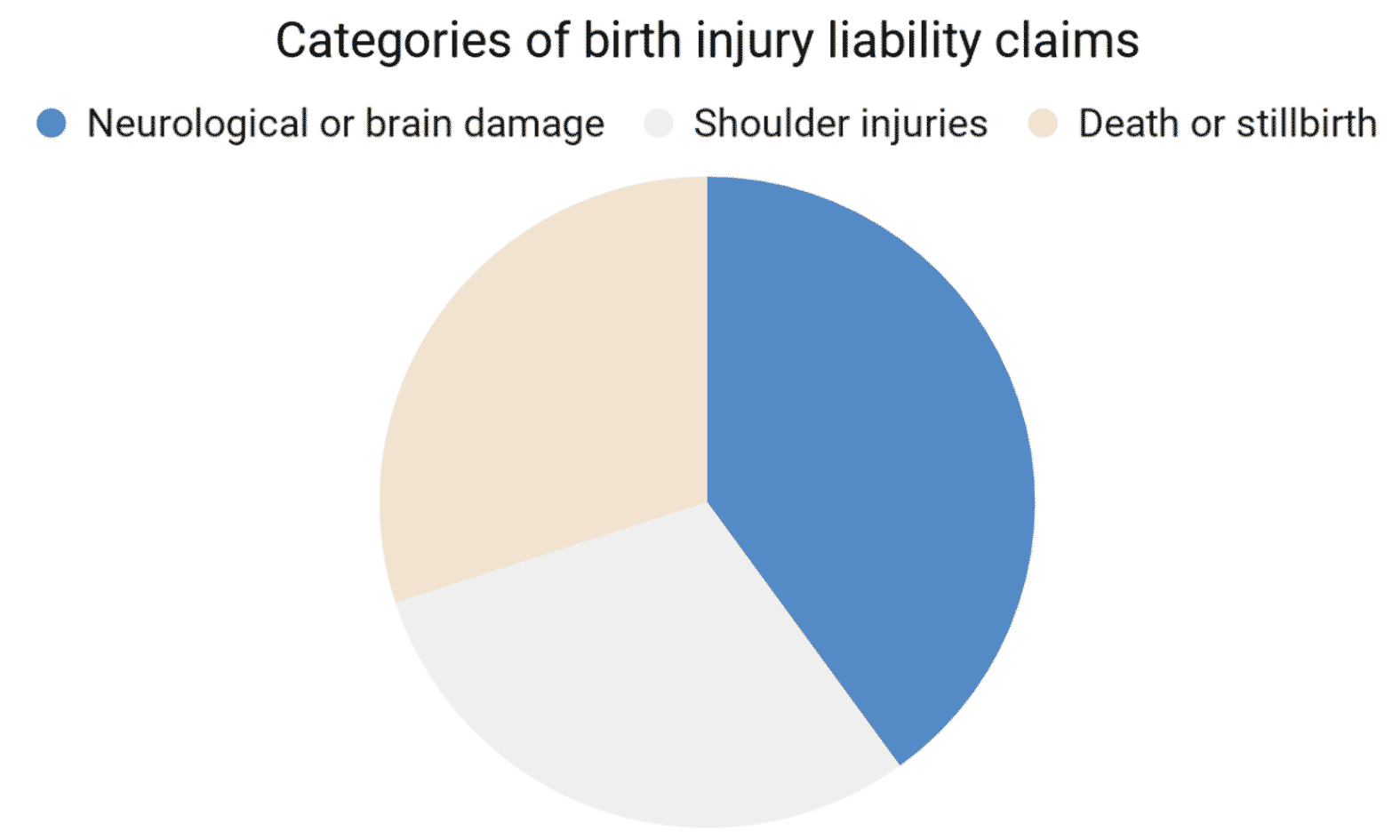How to identify a birth injury and what to do if your baby is affected
If you're a first-time parent, you might already have realized that there's only 1 thing about babies that's predictable…and that's that babies are unpredictable. If you're a seasoned pro at the parenting gig, you've probably learned that no 2 babies are alike, and that each baby has their own set of unique needs.
Most parents of newborns find themselves sleep-deprived a lot of the time, but that phase passes eventually. But some newborns have a set of medical concerns that are different from the average, and if your baby suffers from health issues, you might be wondering if they've had a preventable birth injury.
There are conditions that are birth defects and those that are birth injuries.
Birth defects vs. birth injuries
A birth defect is caused by your child's DNA. Downs syndrome, cleft palates, heart problems, club foot, or other issues can be present at birth and are because of genetics. These conditions can't be prevented, and they are not the fault of the mother or the doctor. A doctor might fail to detect a condition in utero, but the condition was not caused by the doctor and isn't the result of medical malpractice.
A birth injury is preventable and is the result of something that happened during the baby's delivery. Some birth injuries are medical malpractice, and it's important to know if that's the case for your baby. Often, a mother isn't entirely aware of what's happening during delivery — she might be in pain, exhausted, afraid, or even unconscious.
The most common causes of birth injuries include:
- Pulling or twisting the infant during delivery
- Miscalculating the size of the fetus
- Premature or post-mature delivery because of improper dating
- Rh incompatibility
- Failure to provide oxygen to a newborn if needed
- Deliveries using forceps or vacuum extraction
- Failure to perform an emergency cesarean section
- Failure to detect or monitor distress or fetal heartbeat
- Incorrect medication or dosage to the mother during pregnancy or labor
North Carolina medical malpractice and birth injuries
Although birth injuries are very specific, they are included within the area of personal injury law known as medical malpractice.
In order to make a claim for medical malpractice, the plaintiff must prove that the doctor or health professional was negligent. In other words, everyone makes a mistake sometimes — even doctors. But negligence is breaching the duty of care in a way that it was foreseeable that injury would occur.
A parent may sue a medical provider on their child's behalf.
North Carolina is 1 of 6 states that prohibits a certified professional midwife from assisting in childbirth unless the midwife is both certified in midwifery and has a nursing degree. The midwife must also have written consent from a supervising physician. There are very few nurse-midwives in North Carolina who attend home births because it's illegal for a certified professional midwife without a nursing degree to attend a home birth unless accompanied by a physician.
That doesn't mean you can't pursue damages if a midwife is negligent. If a midwife's negligence causes a birth injury, you might need to file a lawsuit against the supervising physician for vicarious liability.
North Carolina is a pure contributory negligence state. That means if you're injured but you shared any fault, you can't recover any damages in a lawsuit.
An example might be if you chose to have an illegal midwife-assisted home birth and then went to the hospital when something started to go wrong. Even if an attending physician makes a mistake during the delivery, they might argue that you already had contributed to the problem by not being in the hospital quickly enough or because of any treatment or procedures that had already occurred.
Damages in a birth injury lawsuit
Your personal medical insurance might cover a portion of your expenses related to a birth injury, but it's not going to cover all of them…or even close to all of them. It's estimated that expenses for a child with cerebral palsy can be up to $1 million over the course of their childhood.
As a parent, your costs will be more than just medical bills, and insurance won't cover most of the additional expenses associated with a child who has a disability.
A birth injury lawsuit can recover damages that include these expenses:
- Medical expenses, including surgeries, hospital visits, doctor visits, diagnostic tests, prescription medications, and other costs
- Caretaking and nursing care
- Assistive devices and equipment, like wheelchairs, hearing aids, braces or orthotic devices
- Home modifications such as wheelchair ramps or door expansions and vehicle modifications
- Respite care
- Physical and occupational therapy
- Scarring and disfigurement
- Mental and emotional anguish, pain and suffering, and other emotional distress
- Physical rehabilitation
- Specialized educational needs
- Loss of capacity to earn a living
North Carolina birth injury statute of limitations
In general, a North Carolina birth injury or medical malpractice victim has 3 years from the date of the injury to file a lawsuit.
However, if the plaintiff is a minor, they have 10 years in which to file a lawsuit. The parent may file a claim for the minor's injury for 3 years from the date of injury.
If the birth injury results in a wrongful death claim, the statute of limitations is 2 years.
Common types of birth injuries
Cerebral palsy
Cerebral palsy (CP) can result in severe and lifelong complications, and it's one of the most severe injuries related to birth trauma. Some individuals with CP will experience light, involuntary movements. Others will have a complete loss of movement. CP is caused by a brain injury that's usually caused when a baby doesn't get enough blood, oxygen, or other nutrients before or during birth.
Brain damage that causes CP can happen before or during birth, or during the first few years of a child's life while the brain is still developing.
Most CP is congenital, or before or during birth. This is caused by:
- Low birthweight
- Premature birth (especially babies born before 32 weeks gestation)
- Multiple births (twins, triplets, etc.)
- Assisted reproductive technology (infertility treatments)
- Infections during pregnancy, such as chickenpox, rubella, cytomegalovirus, or other infections of the placenta or fetal membranes, or maternal pelvic infections
- Jaundice or kernicterus, which happens when a baby has too much bilirubin in their blood
- Mothers who have thyroid problems, intellectual disability, or seizures
- Birth complications, including detached placenta, uterine rupture, or umbilical cord problems that disrupt oxygen supply
Birth-related brain injuries
A brain injury can range from mild to severe, and there are a variety of ways this can happen. These are the most common:
- Cerebral hemorrhage. Bleeding in the brain.
- Intraventricular hemorrhage. Bleeding in the area where spinal fluid is produced, which can often happen in premature babies or those with low birth weight.
- Subarachnoid hemorrhage. Bleeding between the arachnoid membrane and brain cover.
- Cephalohematoma. Bleeding between the skull and skull cover, which causes a bump on the head that can last up to several months.
- Perinatal asphyxia. Lack of oxygen or blood to the brain during labor and delivery, which can lead to mental and physical developmental problems, along with shock, labored breathing, seizures, coma, or death.
Brachial plexus injury
This is damage to the peripheral nerve, which can inhibit normal hand and arm movement. This often improves over time, but if the nerve is actually torn during the birth process, it could result in ongoing medical issues.
Birth-related head injuries
There are also head injuries that are serious but don't necessarily affect brain function. These conditions include:
- Head molding isn't technically considered an "injury." Sometimes, pressure on the head during delivery results in a change in its shape because a newborn's skull bones aren't yet fixed into position. As the baby is pushed through the birth canal, the head elongates in order to allow them to pass through, but this molding—or reshaping—of the head shouldn't affect the brain and the head should gradually reshape itself by the time the baby is a few days or weeks old.
- Scalp swelling, bruising, or scratching is common and resolves on its own within the baby's first few days after birth. Even a fracture of one of the skull bones can usually heal on its own without treatment, unless it forms an indentation.
- Cephalhematoma is bleeding outside the skull bones when the blood accumulates below the periosteum (fibers that cover the skull bone), similar to a bruise. Sometimes they get larger after birth. Usually, a cephalhematoma will resolve on its own without treatment. If it becomes red or drains liquid, you should consult your doctor.
- A subgaleal hemorrhage occurs when there's bleeding directly under the scalp but above the periosteum that covers the skull bones. Unlike a cephalhematoma (where blood accumulates in one area), this blood can spread, and it could result in blood loss and shock. This condition sometimes requires a blood transfusion. In some situations, this happens because of forceps or a vacuum extractor, but other times it's the result of a blood clotting problem.
Oxygen deprivation
Even mild oxygen deprivation can cause life-long physical and intellectual disabilities. This can happen because the doctor doesn't monitor the baby carefully enough during labor, or if the baby remains in the birth canal too long.
Cranial nerve injury or spinal cord
This condition can be caused if a baby was improperly rotated, pulled, or stretched during delivery. It can result in facial paralysis or other spinal cord injuries that lead to paralysis of other parts of the body.
Bone fractures
Bone fractures sometimes occur during a breech birth or when the baby is large. Babies' bones are soft and the bones in their heads haven't yet set at the time of birth, so they break easily. A baby's clavicle (collarbone) can also break or fracture during birth.
Intra-abdominal wound
This blunt abdominal injury can damage a baby's liver and other organs. Though serious, it's thankfully not common.
Common causes of birth injuries
These factors have been identified as the most common liability issues regarding pregnancy and labor and delivery care:
- Inexperienced midwives. A midwife is a medical provider but different midwives can have different levels of clinical experience. A North Carolina nurse-midwife is required to pass national certification exams and be certified by the North Carolina Board of Nursing.
- Poor fetal heart monitoring. A fetus' heartbeat is the primary indicator of distress before, during, and after delivery.
- Miscommunication. A health care provider should communicate with the mother before and during pregnancy and labor and delivery in order to ensure that she has a correct understanding and realistic expectations of the process.
- Poor management of labor and delivery. Nearly half of birth injury claims are attributed to vaginal births that resulted in injuries. Part of a doctor's role during labor is to monitor the fetus for distress and, if distress is observed, the doctor might need to change the labor strategy and perform a C-section or take other measures to keep the baby safe.
Generally, a birth injury liability claim will fall into 1 of these categories:

Source: Coverys, A Dose of Insight
Tweet this
What to do if your baby suffered a birth injury
If your baby was injured during pregnancy or birth, you should take these steps to protect your legal rights and seek medical treatment:
- Obtain medical treatment. If you suspect that your child was injured at birth, you'll want to seek the advice and treatment of a physician who specializes in these kinds of diagnoses. Your baby's primary care provider (pediatrician or family doctor) can likely make a referral to a specialist if that's necessary.
- Keep records of any documents or other evidence related to your birth experience. This can include bills, prescriptions, receipts, and other items. Evidence might also include photos or video captured in the delivery room that might show what happened, who was there, a medical provider's words or reactions, and other information that might be valuable to your case.
- Contact an attorney immediately. The doctor or hospital likely knows immediately if something went wrong during a birth. Your attorney needs to contact their legal counsel right away in order to preserve and request evidence like medical and personnel records, and anything else that might be important.
- Avoid speaking with the insurance company. Many healthcare facilities have invoked "I'm sorry" programs, which encourage doctors and hospitals to express sympathy or fault after a mistake happens. The psychology behind it is that if you feel that you've been treated with compassion and that you've received an apology, you might be less likely to file a lawsuit. Then, their insurance company follows up with you and offers a settlement.
Depending on the severity of your child's injury, the settlement being offered might not even come close to being what you're entitled to in damages. An experienced attorney will communicate with the insurance company and negotiate a fair deal if that's how the claim can be settled.
If you anticipate that your child will require continuing treatment related to the birth injury, it's crucial that you seek the advice of an attorney. Most birth injury lawyers will consult with medical and actuarial experts to determine what you can anticipate with respect to a range of expenses — and it might be far higher than what the insurance company estimates.
That's why you need a North Carolina birth injury lawyer. Your lawyer will make sure that you have the funds you need to keep your child's needs met today, tomorrow, and over the course of their lifetime.
Did you know that medical malpractice law varies by state?
How to find a personal injury lawyer
How do you know you've found the right attorney to take on your case? Where do you even begin your search? Enjuris spoke with personal injury attorneys in our directory to find out their recommendations for hiring the best lawyer. Read more














